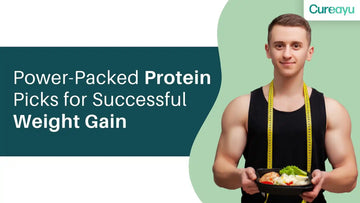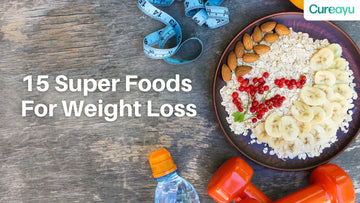Gaining weight can be as challenging as shedding it, especially for those striving to add healthy mass. While the pursuit of weight gain often spotlights protein's crucial role, understanding its significance and identifying the right foods is key. Integrating high-protein foods for weight gain can facilitate a healthier and more balanced journey.
What Is Protein?
Proteins are the building blocks of life, composed of amino acids essential for numerous bodily functions. They play a pivotal role in repairing tissues, supporting immune function, and fostering muscle growth and recovery. There are 20 different amino acids, and our bodies require a full spectrum to function optimally. The human body can produce 11 of these amino acids, known as non-essential amino acids, while the other nine, termed essential amino acids, must be obtained through diet.
Also Read: Understanding the Importance of Physical Fitness for Well-being
What Is Balanced Weight?
Achieving a balanced weight involves more than a mere numerical representation on the scale. It's about attaining a harmonious equilibrium between lean muscle mass and body fat percentage, which significantly contributes to overall well-being. Determining an ideal weight isn't just about reaching a specific number; it's a nuanced understanding of one's body composition.
Methods to Analyze Ideal Weight
Body Mass Index (BMI)
It's a commonly used tool that provides a rough estimate of body fat based on height and weight. While it's a quick assessment, it doesn't account for muscle mass and might not accurately depict an individual's health status. For instance, athletes may have a higher BMI due to increased muscle mass but aren't necessarily overweight.
Body Fat Percentage
Unlike BMI, body fat percentage directly measures the proportion of fat to the total body weight. This method provides a more accurate picture of one's body composition, considering factors like muscle mass and distribution of fat. Tools like skinfold calipers, bioelectrical impedance analysis, and DEXA scans help in determining body fat percentage.
Waist-to-Hip Ratio
This ratio assesses the distribution of fat in the body, particularly around the waist and hips. Higher waist-to-hip ratios often indicate a higher risk of certain health conditions, irrespective of overall weight.
Also Read: Food for Digestion: Navigating Digestion with the Art of Food
How Protein Is Essential for Weight Gain
In the pursuit of weight gain, high-protein foods for weight gain take center stage due to their muscle-building properties. Consumption of adequate protein helps maintain a positive nitrogen balance, crucial for muscle synthesis. With a positive nitrogen balance, the body creates an anabolic environment conducive to muscle growth. Protein also plays a role in boosting metabolism. Increasing your metabolic rate can help you build muscle more efficiently. High-protein foods also aid in repairing and rebuilding muscle tissues post-workout, fostering muscle growth and supporting weight gain.
8 High-Protein Foods for Weight Gain
1. Lean Meats (Chicken, Turkey, Lean Beef)Packed with protein, lean meats offer essential nutrients like iron and zinc. They aid in muscle repair and growth while keeping calorie intake in check.
Chicken Breast: Approximately 31 grams of protein per 100 grams.
Turkey: Similar to chicken, it provides about 29 grams of protein per 100 grams.
Lean Beef: Contains approximately 26 grams of protein per 100 grams and offers vital nutrients such as vitamin B12.
2. Eggs
Nature's protein powerhouse, eggs contain all nine essential amino acids, promoting muscle growth and offering vital nutrients such as choline, essential for brain health.
Whole Eggs: About 6 grams of protein per large egg.
Egg Whites: Pure protein source with approximately 3.6 grams of protein per egg white.
3. Greek Yogurt
Rich in casein protein, Greek yogurt aids in muscle recovery and growth. Additionally, it contains probiotics beneficial for gut health. Greek yogurt is more concentrated than regular yogurt, offering more protein per serving.
Protein Content: Greek yogurt contains around 10 grams of protein per 100 grams.
4. Legumes (Lentils, Chickpeas, Beans)
Loaded with both protein and fiber, legumes contribute to muscle repair and provide a steady release of energy, aiding in weight gain. They are also rich in essential nutrients like iron, magnesium, and folate.
Lentils: Approximately 9 grams of protein per 100 grams cooked.
Chickpeas: About 9 grams of protein per 100 grams cooked.
Beans: Various types, such as black beans and kidney beans, offer around 8-9 grams of protein per 100 grams cooked.
5. Quinoa
A complete protein source, quinoa contains all nine essential amino acids, making it an ideal grain for muscle building and overall health. Besides protein, it is a good source of fiber, magnesium, and antioxidants.
Protein Content: Contains approximately 8 grams of protein per cup cooked.
6. Nuts and Nut Butters
Almonds, peanuts, and their buttery counterparts are high in protein and healthy fats, providing a calorie-dense option for weight gain.
Almonds: About 21 grams of protein per 100 grams.
Peanut Butter: Roughly 25 grams of protein per 100 grams.
7. Milk
An excellent source of whey and casein proteins, milk aids in muscle repair and growth. It also contains calcium crucial for bone health. For those who are lactose intolerant, lactose-free alternatives or plant-based milks fortified with protein can be a suitable option.
Protein Content: Approximately 3.4 grams of protein per 100 ml.
8. Salmon
Rich in omega-3 fatty acids and high-quality protein, salmon supports muscle repair and growth while offering additional health benefits such as reducing inflammation and improving heart health.
Protein Content: About 20 grams of protein per 100 grams.
Also Read: Optimizing Health with Testosterone: Natural Boosters and Ayurvedic Insights
Conclusion
In the pursuit of weight gain, a balanced diet rich in protein plays a pivotal role. Incorporating these high-protein foods for weight gain into your daily meals can significantly contribute to muscle growth and a healthy weight. However, it's essential to pair these foods with a consistent exercise routine tailored for muscle building to achieve optimal results. Remember, a balanced weight gain journey emphasizes not just the numbers on the scale, but overall health and well-being.
By integrating these high-protein diets for weight gain tips and focusing on protein foods for weight gain, you can efficiently work towards a healthier and more balanced physique. Adopting a varied diet ensures you get a comprehensive range of nutrients, which not only supports muscle growth but also enhances overall health.












